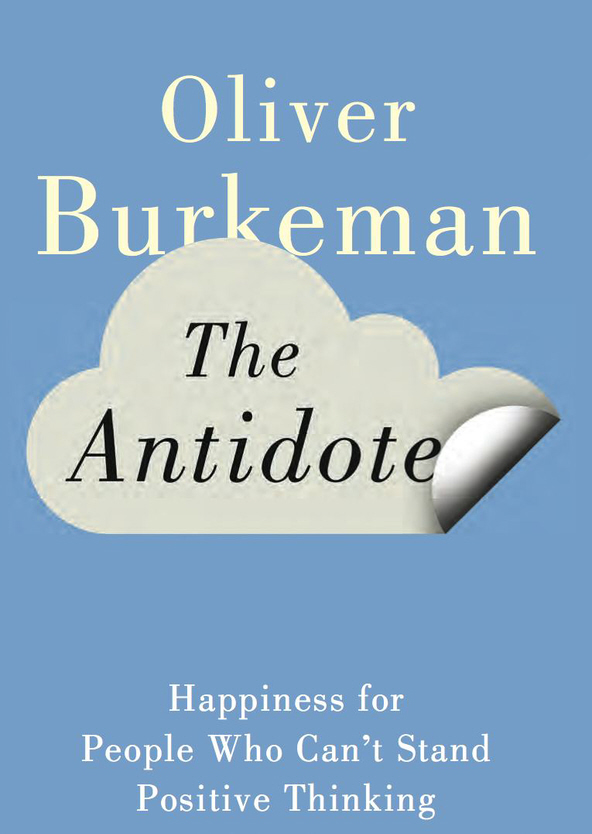Should we all be striving towards happiness? Should we think positively? Should we try to ignore any difficult thoughts, feelings, or situations that arise? Is certainty the way forward in life?
Many self-help books would shout ‘Yes!’ in answer to those questions.
Oliver Burkeman isn’t so sure.
In his latest book, The Antidote, Burkeman entertainingly entwines research into different philosophies for living (Stoicism, Buddhism, the memento mori, etc) with the stories of his own attempts at trying them out. For example, he might try calling out the names of tube stops in order to face his fear of embarrassment, or he might spend a week silently meditating from 5.30 am to 9.30 pm, while harsh self-criticism or, perhaps even worse, Aqua’s “Barbie Girl” intrude on his thoughts. Burkeman is a funny writer, even as he discusses serious, even life-changing, topics.

by Oliver Burkman
236 pp., Edinburgh: Canongate, £19.99
Burkeman, who writes for the Guardian, including the great weekly column This Column Will Change Your Life, is the lead writer in what I call the “anti-self-help self-help” genre or even “beyond-self-help self-help”. Such books are not about positive thinking, finding partners, and getting promotions at work; they do not offer facile instructions for living a happy, easy life. Rather, they challenge readers. They use academic research in an accessible way as support in order to suggest that readers reconsider their assumptions and find new ways of thinking and being.
His previous book, Help! How to Become Slightly Happier and Get a Bit More Done, was comprised of some of his columns and thus each section was quite short. It was possible to read a page or two at a time and to get a new idea fairly quickly. The Antidote is different in that there are just eight chapters and in every one, Burkeman takes on a subject and explores it in detail, often by interviewing people, reading and analysing popular and academic books, and investigating the subject in a personal way (such as by going to a motivational talk).
In the chapter on insecurity, for instance, Burkeman takes on what may be an especially modern-day problem (in part due to a loss of religious beliefs): our desire for secure, complete knowledge. Burkeman writes, “a staggering proportion of human activity – in politics, business, and international relations, as much as in our personal lives – is motivated by the desire to feel safe and secure. And yes this quest to feel secure doesn’t always lead to security, still less to happiness.” (p. 129) The problem is that “the strategies that are designed to bestow a feeling of security often don’t leave us more secure. They may even have the opposite effect.” (p. 131, italics original) The emphasised word in that quote hints at where Burkeman is going. Feeling secure is not the same thing as actually being secure. People tend to want to feel secure, and seem to believe that means they are secure. What Burkeman – supported by thinkers such as Heraclitus, Confucius, and Alan Watts, and explored partially through a visit to Africa and an analysis of airline safety in this age of terrorism – suggests is that we accept insecurity. Life is insecure and ever-changing. By learning to admit and perhaps even to enjoy the changing nature of human life, we can stop fighting against it, “struggling to find security, permanence, fixity, and stability” (p. 146). It is this struggle that causes us stress, because it means that we are fighting a losing battle to change the facts of life.
Other chapters continue in the same vein; Burkeman explores an issue from a variety of angles, and then gently comes to a conclusion for what would make our lives less unhappy and difficult. This is not the same as saying that his recommendations will make our lives happy or that we should blindly follow them, and it’s important to clarify that, as that is what puts him firmly in the “beyond-self-help self-help” camp. So what are his overall findings and suggestions? Well, obviously you ought to read his book to find out for yourself, but as he puts it “some of the most basic doctrines that dominate our thinking about happiness fail to work because we struggle for them too strenuously.” (p. 129) In other words, we have to stop trying to hold on to things so tightly, and stop searching for firm answers and quick fixes. Consideration may be the key.
While here I seem to be recommending a quick fix – i.e. that you read Burkeman’s The Antidote – the ideas it will leave you with are anything but quick. His book is thought-provoking and invigorating, and it is indeed an antidote to all those glib and simplistic self-help books.










